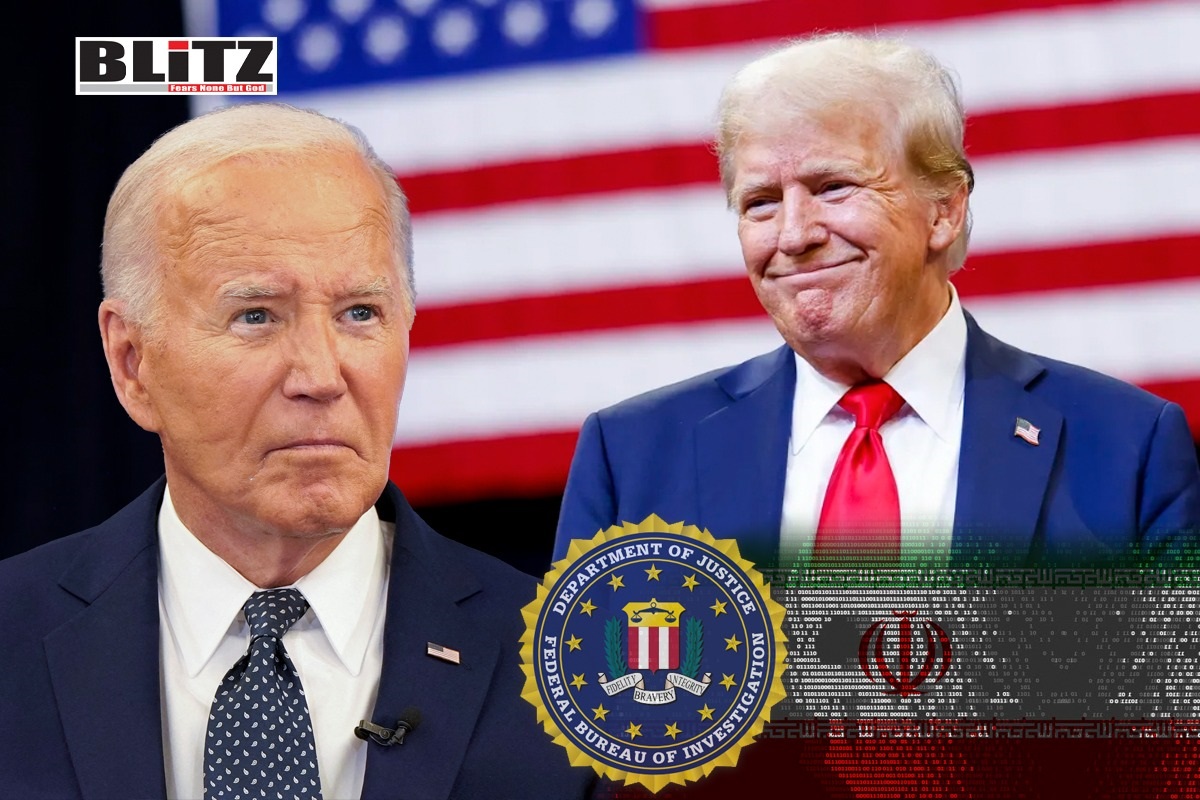Iranian hackers leaked Trump campaign data to Biden team
- Update Time : Friday, September 20, 2024

In a chilling revelation that adds another layer of complexity to the 2024 US presidential race, federal officials disclosed that Iranian hackers allegedly obtained sensitive materials from Donald Trump’s campaign and forwarded them to President Joe Biden’s re-election team earlier this year. The FBI, Cybersecurity and Infrastructure Security Agency (CISA), and Office of the Director of National Intelligence (ODNI) jointly announced the breach on September 18, spotlighting Iran’s ongoing cyber activities aimed at destabilizing the US electoral process.
The joint statement described the timeline of events, explaining that in late June and early July, Iranian hackers sent unsolicited emails containing excerpts from stolen, non-public Trump campaign documents to individuals associated with the Biden-Harris campaign. While the Biden team’s response, or lack thereof, remains unclear, federal agencies emphasized that there is no current evidence to suggest the Biden campaign engaged with these materials. However, the implication that foreign actors are distributing stolen campaign data to influence a US election is undeniably troubling, raising serious concerns about national security and the sanctity of American democracy.
This incident forms part of a broader pattern of Iranian cyber operations targeting US elections. Officials have expressed concern over Iran’s strategic objective of sowing discord and undermining public trust in the electoral process. The official statement from US agencies warned that “Iranian malicious cyber actors” have been ramping up their efforts to disrupt the 2024 election, including by sending stolen Trump campaign materials to media outlets.
Iran’s motivations are clear. The regime in Tehran has been vehemently opposed to Donald Trump since his first term, particularly after his administration withdrew the US from the 2015 Iran nuclear deal and imposed crippling sanctions on the country. Tensions reached a fever pitch in January 2020, when Trump ordered a drone strike in Iraq that killed General Qasem Soleimani, commander of the Iranian Revolutionary Guard’s elite Quds Force. Soleimani’s assassination enraged Iranian leaders, who vowed revenge, and it appears that these cyber operations are part of Iran’s broader efforts to prevent Trump’s return to power.
According to reports, Iranian cyber actors were also linked to previous cyberattacks targeting US political entities. Earlier this year, Microsoft revealed that Iranian hackers had gained access to the account of a “high-ranking official” within Trump’s campaign just as the former president was finalizing his vice-presidential pick. This underscores the calculated nature of Iran’s offensive, focusing on both collecting valuable intelligence and strategically leaking information to weaken Trump’s chances of re-election.
The significance of the hack extends beyond the immediate fallout from stolen data. The Biden campaign’s apparent disassociation from the unsolicited emails is key in framing the controversy. In their joint statement, the US intelligence agencies were careful to note that there is no direct evidence linking the Biden-Harris campaign to any illegal conduct. Still, skepticism looms. Some, like conservative commentators, are doubtful that the Biden team would have ignored such politically explosive material.
From a strategic standpoint, Iran’s alleged dissemination of Trump campaign documents seems designed to inject further chaos into an already turbulent election cycle. Iran’s ultimate aim, federal officials argue, is to “stoke discord and undermine confidence in our electoral process.” By distributing hacked materials to both political rivals and media organizations, Tehran seems intent on destabilizing both Trump and the broader US political system. In the eyes of foreign adversaries like Iran, a divided America benefits their geopolitical goals, particularly in the Middle East, where US influence remains significant.
Compounding the issue is the role of media organizations in handling hacked materials. Last month, it was revealed that Politico had received internal Trump campaign documents from an anonymous source using an AOL email account, heightening concerns about the ethical handling of hacked information. These documents reportedly included communications from top Trump campaign officials and a research dossier on Senator JD Vance, laying out his political vulnerabilities.
When Politico reached out to the anonymous source for more information, the sender refused to disclose their identity, warning that further inquiries would legally compromise the news organization’s ability to publish the materials. This opaque communication underscores the risk of media outlets becoming unwitting players in foreign-led disinformation or influence campaigns.
As Iranian hackers continue to target US media, their tactics signal an intent to manipulate public opinion by pushing stolen, often incomplete information into the public domain. News organizations, many of whom thrive on scoops and exclusive access to sensitive information, face a difficult ethical dilemma: should they publish potentially impactful documents, or should they refrain from using materials that were obtained illegally, especially by foreign adversaries?
Iran’s actions are not isolated incidents but part of a broader trend of foreign interference in US elections. In recent years, foreign actors-including Russia and China-have used cyber operations to influence electoral outcomes, primarily through disinformation campaigns and cyber espionage. What distinguishes Iran’s 2024 hacking efforts is its boldness in not just collecting information but distributing it to US media outlets and rival campaigns.
The FBI’s statement emphasized that it has been actively tracking the Iranian hacking campaign and has been in contact with affected individuals within Trump’s organization. The federal government is pursuing all available leads in an attempt to disrupt the threat actors responsible. With foreign actors increasingly targeting the US electoral system as the November 2024 election approaches, the stakes could not be higher.
This incident underscores the fragile state of election security in the United States. While the federal agencies investigating the breach have not yet found concrete evidence that the Biden-Harris campaign used the stolen materials, the perception of foreign interference casts a long shadow over the democratic process. As the US approaches the 2024 election, there is a growing sense of urgency to safeguard both the integrity of election campaigns and public trust in the results.
Iran’s cyber offensive against Trump’s campaign is emblematic of a new frontier in geopolitical warfare-one where traditional military operations have given way to digital subversion. Iran, as the world’s leading state sponsor of terrorism, understands the power of destabilization and is using its cyber capabilities to inflict damage on Trump’s campaign while undermining US democracy as a whole.
As the FBI and other agencies work to dismantle these cyber operations, the American public must remain vigilant about the growing role of foreign interference in shaping the future of US politics. Ensuring that the upcoming election is free from undue foreign influence is crucial not only for the 2024 race but also for the long-term stability of the nation. Only through greater cybersecurity measures and public awareness can the US hopes to thwart these increasingly sophisticated cyber threats.











